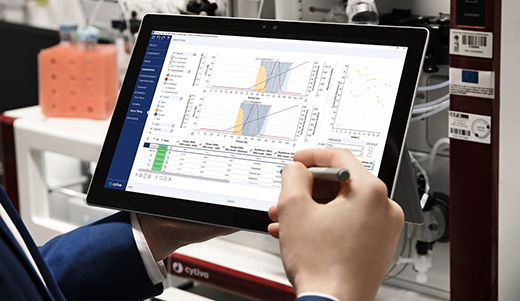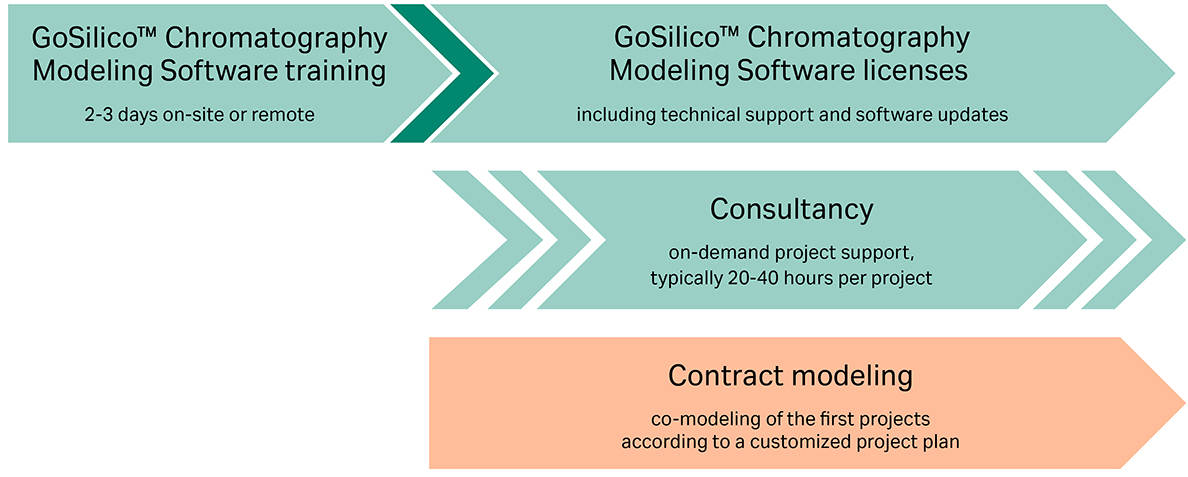The application of mechanistic modeling requires expertise for effective use. When planning to implement this ground-breaking technology one essential question must be addressed beforehand: when is it most appropriate to build this expertise in-house, or when to contract in established experts?
Do I need an interdisciplinary team of experts to pursue modeling?
Modeling is an interdisciplinary and complex affair, though the barrier of entry has fallen significantly in the past few years. In its early years, the application of mechanistic modeling was reserved to academia, as it required profound expertise and knowledge in mathematics, computer science, and engineering.
Over the past few years, this situation has changed. The increasing need for mechanistic process understanding, along with growing time-to-market pressure and process economic drivers has driven the need for mechanistic modeling. This, in turn, has spurred the development of intuitive and user-friendly simulation tools such as GoSilico™ Chromatography Modeling Software, that are far more powerful, versatile, and accessible than academic command line tools. Such in silico tools place the complex mathematics behind accessible graphical user interfaces, making simulation feasible to process engineers and scientists without prior expertise in mathematics and computer sciences.
However, as mechanistic chromatography models rely on natural laws describing fluid dynamics and thermodynamic phenomena, implementing an effective model still requires expertise. It is important to understand the significance and impact of the model equations for gaining insights into the physical processes, such as discerning physically reasonable parameter values for the applied isotherm equations. As intuitive as mechanistic modeling tools are today, their application still needs some expertise that must be built internally or outsourced.
Build the expertise in-house or collaborate with experts?
An important question to ask before implementing mechanistic modeling in your company or department is: what is the intended application for your mechanistic models? Mechanistic models can cover the whole product life cycle, from early process development to late stage process characterization, scale-up, or root cause investigations. They may also comprise one specific subset only, with each application subject to varying complexity and therefore required know-how.
Modeling expertise is best developed stepwise. Increasing stages of complexity should be modeled starting with simple processes and applications and evolving these models over the lifetime of the process development. If timelines or personnel constraints impede this process or the intended application is simply too complex for novices, outsourcing the modeling activities partially or completely may be favorable.
GoSilico, now part of Cytiva, has been successfully implementing mechanistic models in the biopharmaceutical industry since 2016, having customers amongst the biopharma giants, Contract Development and Manufacturing Organizations (CDMOs) and smaller biotech companies. Being part of Cytiva, this well-proven software mechanistic modeling expertise is now supported by decades of experience in developing chromatography processes and equipment. Tailored service offerings provide modeling solutions applicable across the entire industry, thus providing several routes to gaining mechanistic modeling expertise.
Building the expertise in-house
For many companies, becoming an expert is the option of choice, as they plan to capitalize on mechanistic modeling extensively in their future process development activities, and therefore need to ensure their personnel develop this skillset. Digitalization is proceeding rapidly and more companies are generating in-house modeling expertise to keep up with industry standards and develop better and more robust processes in shorter timelines, while meeting regulatory demands of Quality-by-Design and associated process understanding.
When it comes to the decision of becoming an expert or contracting one, timelines and resources are the key questions. To become an expert in modeling and to develop the required skills in-house, it is necessary to practice modeling frequently. If that is not possible because of time constraints, the progress may be slower.
For this reason, most companies are not only training one person but empower teams of scientists to become proficient users of GoSilico™ Chromatography Modeling Software. Within the team it is easier to discuss challenges, speed up the knowledge acquirement, and to adapt company internal standard operating procedures and workflows to modeling needs. If team members are not solely dedicated to modeling but also to other tasks such as wet-work, as it is the case for most companies, this modeling team approach is highly beneficial. There are also several companies where individual people are almost exclusively occupied with modeling tasks after developing their modeling skills. Consequently, they are highly proficient experts, often developing processes in silico across multiple sites from the comfort of their desks.
If a company or department is completely new to modeling, it may be beneficial to hire one of those experts, but the supply of these skilled personnel rarely meets demand. For practical reasons, it may therefore be the only option to build up the expertise in-house within the future modeling team. To get started, process developers planning to do modeling in-house for the first time should participate in an intensive software training course covering the theoretical background, modeling workflows, and hands-on practice to get to know mechanistic modeling.
As the GoSilico™ Chromatography Modeling Software is still an expert tool, additional practical experience is required for proficient usage, dependent on the prior modeling experience of new software users. This additional experience can best be acquired by modeling your own projects, much like any technical skill. It makes sense to start with the simpler modeling cases to boost expertise.
The nature of the chromatographic separation, processes used, and the quality of data, all impact model complexity and mean that some modes of interaction are easier to model over others. A process which is commonly modeled is a monoclonal antibody (mAb) in bind and elute mode on a cation exchange resin (CEX). For this process, the required equations are well-understood and consequently their application is often straightforward. Experience shows that modeling novices need about two or three times longer to finish a modeling project than an expert would on the same tasks, even with project overheads such as data transfer, experimental design, and limitations on working remotely across time zones.
Therefore, almost all new process developers rely on GoSilico™ Consulting to be guided through their first projects, enabling first success cases to be easily realized within 3-6 months. They may also benefit from Cytiva’s mechanistic modeling ecosystem; f(x) columns allow one reduce the time needed for column characterization, and the seamless interface with ÄKTA™ file formats reduces the need for tedious data formatting.This means the novice modeler can focus their efforts on understanding their own process. Afterwards, the throughput of processes to be modeled can increase gradually, typically through simulating more complex modes of interaction such as mixed-mode chromatography with varying pH. Following this approach, the modeling capabilities will be built up stepwise, organically, through first-hand experience.
Collaborating with experts
The above approach may not fit all modeling needs. What if the appropriate timelines, resources, or required complexity are restrictive? Can you still use modeling?
The answer to that question is yes. Modeling is a powerful tool to reduce the experimental workload and to design robust and efficient processes within given timelines, but as the timelines are sometimes too challenging, it may not be possible to build the required expertise in-house and in time. Alternatively, the initial modeling activities can be outsourced by engaging GoSilico™ Contract Modeling Services, which reduces the timeline for your first projects from months to weeks.
The benefit of this is that teams within Cytiva use our years of modeling expertise, combined with decades of experience in developing chromatography processes to develop high-quality digital twins of your process. This comprises all modeling activities, from experimental design, model selection, data review, model calibration, model interrogation, and documentation. Your team is then only responsible with either providing historical data, performing a few relatively simple calibration and validation experiments with always-available consultation and guidance from the mechanistic modeling specialists within Cytiva.
Fast troubleshooting of projects often requires deep know-how and proficient knowledge in modeling, considering deviations and unexpected performance is typically due to a combination of different, often seemingly unconnected, process parameters and material attributes. Root cause analysis is a typical example in which immediate access to mechanistic process understanding often means the consultation and contract modeling workflow is appropriate. Additionally, complex process modalities, such as continuous chromatography, pH dependent mixed-mode separations, and developing adaptive control schemes require a greater level of modeling understanding
These processes, when combined with the typical drivers of time-to-market, and lean process development, often mean one cannot wait for expertise to be built, but may rely on GoSilico™ Contract Modeling Services to develop these models, provide updates, documentation and further training such that the knowledge can be managed and disseminated between sites. Even established modeling teams may require this external expertise for rapid digital twin synthesis.
A solution tailored to your needs
To summarize, initially it may be time consuming to develop in-house expertise, and the 3 to 6 months are an investment in future capabilities both in process and personnel. If timelines or resources are limited, often you can use GoSilico™ Contract Modeling Services to benefit from our know-how, to manage all aspects within a project or perform the modeling activities in-house. There is never a single solution for the entire industry, but Cytiva works to tailor an offering considering all factors impacting a prospective modeling project to accelerate better bioprocesses leading to better patient outcomes.

